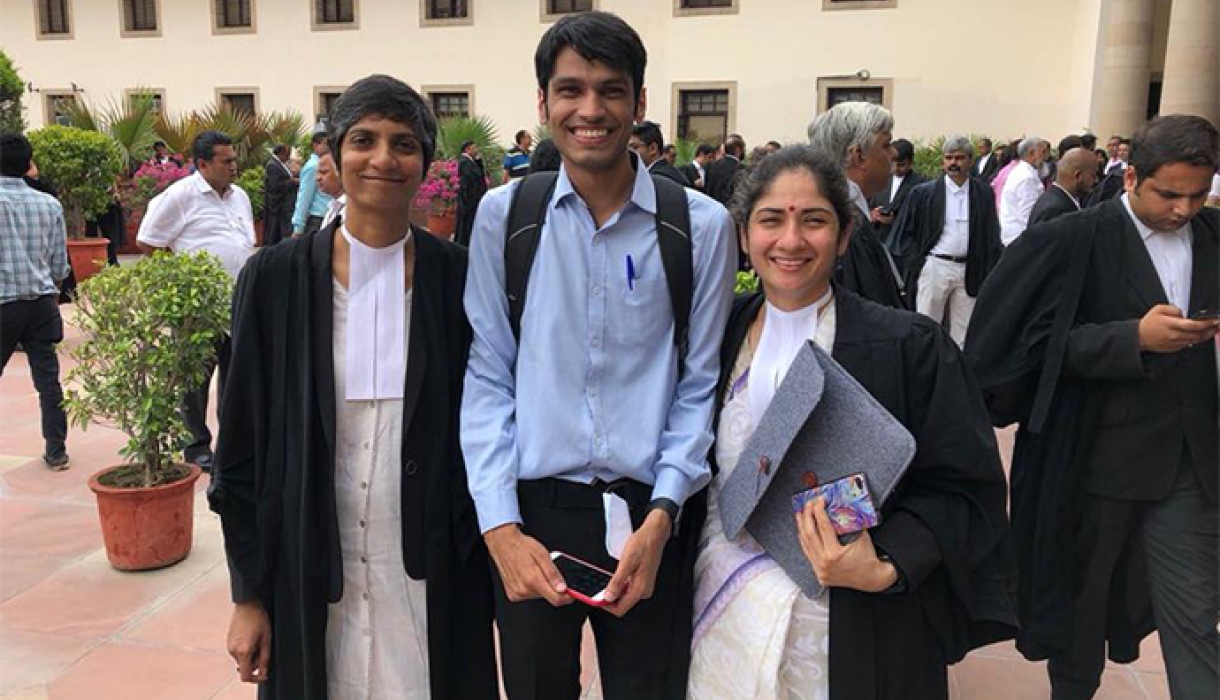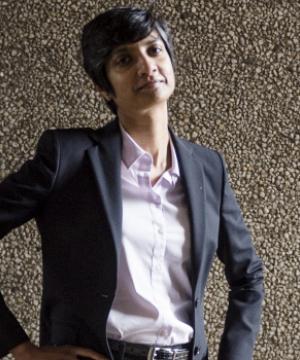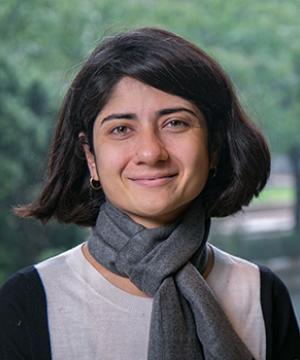Columbia Lawyers Win Historic LGBT Rights Victory in India
Menaka Guruswamy and Arundhati Katju ’17 LL.M. succeed in their challenge to strike down India’s colonial-era law known as Section 377 forbidding gay sex.

Above: From left, Menaka Guruswamy, Kumar Vardhman (petitioner), and Arundhati Katju ’17 LL.M. before oral arguments
The Indian Supreme Court’s landmark decision on Sept. 6, overturning an 1860 law that criminalized “carnal intercourse against the order of nature,” has been hailed as a giant step for LGBT rights in the world’s largest democracy.
It was also a professional triumph for two Indian public-interest litigators at Columbia Law School. Menaka Guruswamy and Arundhati Katju ’17 LL.M. were the prime architects of a creative, multi-year advocacy campaign to rid India of what Guruswamy called “a colonial stain on our collective national conscience”—an archaic law that sowed debilitating fear and stigma among sexual minorities.
“It’s a wonderful day,” said Guruswamy by telephone from New Delhi as she celebrated the ruling with fellow lawyers and clients. “We are thrilled with the decision because the court has gone much farther than decriminalization,” she said—emphasizing the humanity and constitutional equality of LGBT people and even apologizing for past mistreatment.
In an exhaustive 495-page decision, a unanimous five-justice panel, led by Chief Justice Dipak Misra, not only rejected the anti-sodomy law but also stressed India’s constitutional goals of protecting individual rights and dignity.
“The natural identity of an individual should be treated to be absolutely essential to his being,” the chief justice and a colleague wrote. “Constitutional morality cannot be martyred at the altar of social morality.”
The expansive decision seemed to bear out the strategy laid out years earlier by Guruswamy and Katju. The two lawyers had won praise from gay rights activists and fellow lawyers for combining exhaustive legal reasoning with a broad appeal, reaching beyond the law at issue, for the fundamental rights of LGBT people.
“We wanted to show this case is not narrowly about criminalizing sex acts,” Katju said. “It’s about love and life.”
When the case was heard in July, the courtroom was packed with many of the petitioners present, and the atmosphere was electric, according to Katju. “It’s rare to hear the stories of LGBT people told in a courtroom with empathy and dignity,” she said.
Guruswamy, a Rhodes Scholar, is a research scholar and lecturer at Columbia under the BR Ambedkar Fellowship in Indian Constitutional Law and a prominent litigator in India on rights-related issues. Katju, a former criminal defense lawyer, was a Human Rights Fellow at Columbia in 2016-17, earned an LL.M. and is now pursuing a J.S.D. at the Law School.
The newly vanquished law, Section 377 of the Indian Penal Code, allowed for lengthy prison terms for so-called unnatural acts. While prosecutions were rare, it often provided a pretext for blackmail and extortion, discouraged the reporting of sexual assaults, and has been used by the police to bully gay people, according to victims.
While often referred to as a sodomy law, Section 377 cast a far wider and darker shadow, Guruswamy and Katju stressed. “It criminalizes the very existence of LGBT persons by criminalizing their sexuality, an attribute which is as inherent and intrinsic to a person as their race or gender,” declared their 2016 petition that led the Supreme Court to take on the case, Navtej Singh and Others v Union of India.
Section 377 had been overturned by a Delhi High Court in 2009. But in 2013, a two-judge panel of the Supreme Court said that only the legislature could change it.
Guruswamy and Katju, who had collaborated in the 2013 proceeding, swung into high gear, devising a legal strategy with elements that were strikingly new in the Indian context. Working mainly with three other lawyers, they enlisted five prominent Indians to become petitioners to the Supreme Court—and publicly declare their sexuality and describe the law’s personal toll.
They included a classical dancer, a journalist, a television chef, a hotelier, and a business consultant; more recently, other petitioners joined including 20 LGBT students and graduates of the elite Indian Institutes of Technology, some of whom described how fear of exposure had caused depression and warped their careers.
The lawyers cast the issue broadly, asking the Court to declare that the right to life under the Constitution includes a right to sexuality and choice of sexual partners.
Guruswamy’s oral arguments were a highlight, observers said. In court and in a 42-page brief, prepared together with Katju and another colleague, Guruswamy ran through the many Constitutional provisions that were violated by Section 377, described relevant decisions abroad and noted the conclusions of major psychiatric associations that homosexuality is a normal variant.
But it was her evocation of the suffering of the petitioners and the larger meaning of the case that captured the most attention.
“This is a plea by six to eight percent of the Indian population to be regarded as full citizens and not unconvicted felons,” she said. “This is love that must be constitutionally recognized and not just sexual acts.”
One newspaper commentator described “the sheer force of her arguments that seemed to rip through the tangles of legal discourse and force the Court to confront the human cost of Section 377.”
The Indian government, though dominated by a conservative Hindu nationalist party, did not defend the challenged law, only saying that the court should stick to the narrow question of sexual practices and not consider related issues like marriage and adoption.
The ruling, sweeping as it was in declaring the rights of LGBT people, did not elaborate on related issues like marriage and inheritance, suggesting that far more litigation will be required to give full expression to equality.
“We're still reading the judgment,” Katju said after the decision was announced, “and there's a long road ahead.” But the decision, the lawyers said, will provide a firm foundation on which to base future arguments for full equality under the law.
The presence of Guruswamy and Katju at Columbia as they worked on this milestone case has “enriched the law school community tremendously,” said Suzanne B. Goldberg, executive vice president for university life at Columbia, clinical law professor and co-director of the Center for Gender and Sexuality Law.
Among many activities on campus, the two made a well-attended presentation on the case in January, introducing Navtej Singh Johar, the dancer who was one of the petitioners.
“It was a powerful conversation about how bringing people’s stories to the forefront can make all the difference in advocacy,” Goldberg said. “I think it was great for students to see lawyers who learn from and appreciate their client as much as the client learns from and appreciates them.”
Katju said she will stay active on the Indian legal scene as she pursues her doctorate in New York. Guruswamy has another year left on her Ambedkar Fellowship—which is named for a Columbian, Dr. Bhim Rao Ambedkar, a man considered the father of the Indian Constitution. The Ambedkar Chair at Columbia Law School was financed by the Government of India to deepen research and scholarship on Indian Constitutional law. (Appropriately enough, her argument in the 377 case quoted Ambedkar’s call for the primacy of “constitutional morality” in the rule of law.) This spring, Guruswamy will teach a class she offered last year Constitutional Design in Post-Conflict Democracies (which, she pointedly said, must include consideration of the fracturing United States.)
“So much of why I love the law is that you can really litigate freedom,” Guruswamy said. “You can use your country’s constitution to expand freedom.”
In the hours after their historic Supreme Court victory, as Guruswamy, Katju, and colleagues celebrated, New Delhi was inundated with monsoon rains.
“It’s quite lovely,” Guruswamy said. “The skies have opened up to celebrate with us.”
# # #
Written by Erik Eckholm
Selection of media coverage of the decision:
The New York Times: "India Strikes Down Colonial-Era Ban on Gay Sex"
The Times of India: "World media hails landmark SC verdict legalising gay sex"
Bar and Bench: "Nothing Unnatural about it: Supreme Court decriminalises Gay Sex, reads down Section 377
Posted on September 6, 2018

